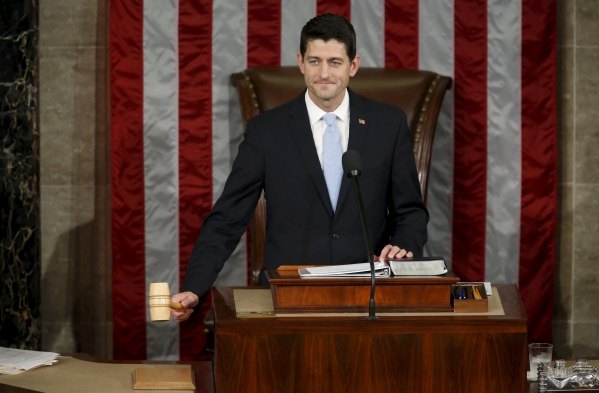Washington Digest: Ryan takes role of House speaker
WASHINGTON — Rep. Paul Ryan was elected the 54th speaker of the House last week, ending a tumultuous month of intra-party politics for House Republicans.
The Wisconsin Republican replaces John Boehner, R-Ohio, who stepped down after holding the gavel for the GOP majority for the past five years. His resignation was driven at least in part by a growing rift between establishment Republicans and hard-line Freedom Caucus conservatives.
Ryan, 45, reluctantly agreed to run for speaker after gaining support from conservatives and moderates in the GOP caucus. In accepting the job, Ryan said he would look to give rank-and-file members more say in legislation that reaches the floor. He also expressed the hope that Congress will find a way to function more smoothly.
"What a relief it would be to the American people if we finally got our act together. What a weight off their shoulders," he said.
The vote for speaker fell largely along party lines. Ryan was backed by 236 Republicans. Rep. Nancy Pelosi, D-Calif., was backed by 184 Democrats. A handful of dissenters in both parties cast votes for other individuals.
Reps. Mark Amodei, Cresent Hardy and Joe Heck, all R-Nev., supported Ryan. Rep. Dina Titus, D-Nev., backed Pelosi.
Budget deal struck
The House and Senate approved a budget and debt ceiling deal negotiated by the White House and congressional leaders of both parties that would allow some $80 billion in new defense and domestic spending over the next two years.
The deal eliminates so-called sequestration spending caps by tapping a variety of new revenue streams that include eliminating some tax loopholes, selling off crude oil held in the Strategic Petroleum Reserve and auctioning off wireless spectrum.
It also limits a premium increase for some Medicare Part B beneficiaries scheduled for next year and prevents a potential 20 percent cut to Social Security Disability Insurance. And, it will raise the government debt ceiling until March 2017, allowing for additional borrowing on the nation's credit card that otherwise would have maxed out in just a few days.
Democrats lined up behind the deal.
"This agreement is not perfect — no legislation is — but it accomplishes two major priorities that Democrats have supported from the very beginning," said Senate Minority Leader Harry Reid, D-Nev. "The budget agreement promotes economic growth and job creation over the next two years by providing relief from the devastating sequester cuts. It also invests equally in both the middle class and the Pentagon."
Conservative Republicans opposed it, saying the increased spending was reckless given the nation's $18 trillion debt.
"I shudder to think what President Obama for 15 months will do with an unlimited credit card that the Republican majority in the House of Representatives and the Republican majority in the Senate have handed over to him," said Sen. Ted Cruz, R-Texas, a presidential candidate.
The House voted 266-167 in favor of the bill. The Senate later approved it 64-35. It now goes to President Barack Obama, who plans to sign it into law.
Titus and Reid voted in favor. Amodei, Hardy, Heck and Sen. Dean Heller, R-Nev., opposed it.
Export-Import Bank reauthorization
The House approved legislation to reopen the federal Export-Import Bank, whose charter expired in July.
The bill passed, 313-118, with pro-labor Democrats joining pro-business Republicans in support of reviving the bank, which provides subsidies and loan guarantees to foreign buyers of U.S. goods. Opposition came from the conservative Tea Party wing of the Republican Party, who say its benefits go mostly to corporate giants such as Boeing, Caterpillar and General Electric.
Democrats defended the bank, saying it creates jobs by helping U.S. companies compete in the global market. The U.S. Chamber of Commerce, National Association of Manufacturers and a number of labor unions lobbied for the bank.
Republican conservatives, however, labeled it as corporate cronyism.
"The real question of the debate we are having comes down to this: Do we let government pick and choose who it gives special taxpayer loans to or not? I believe our constituents know very well what the right choice is. They don't want their tax dollars backing up loans for any businesses. That is not the government's job," said Rep. Kevin McCarthy, R-Calif.
Titus, Amodei and Hardy voted in favor of reauthorizing the bank. Heck voted against it.
Cybersecurity
The Senate overwhelmingly approved legislation to encourage businesses to share information on cyberthreats despite some concerns that it fails to protect individual privacy.
The legislation would protect companies from lawsuits that might arise from voluntarily sharing information about cyberthreats with the government or other private firms.
"This landmark bill finally better secures Americans' private information from foreign hackers," said Senate Intelligence Committee Chairman Richard Burr, R-N.C. "American businesses and government agencies face cyberattacks on a daily basis. We cannot sit idle while foreign agents and criminal gangs continue to steal Americans' personal information as we saw in the Office of Personnel Management, Target, and Sony hacks."
The bill was approved, 74-21. Reid supported it. Heller voted against it.
Contact Peter Urban at purban@reviewjournal.com or at 202-783-1760. Find him on Twitter: @PUrbanDC.






















